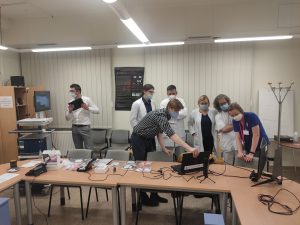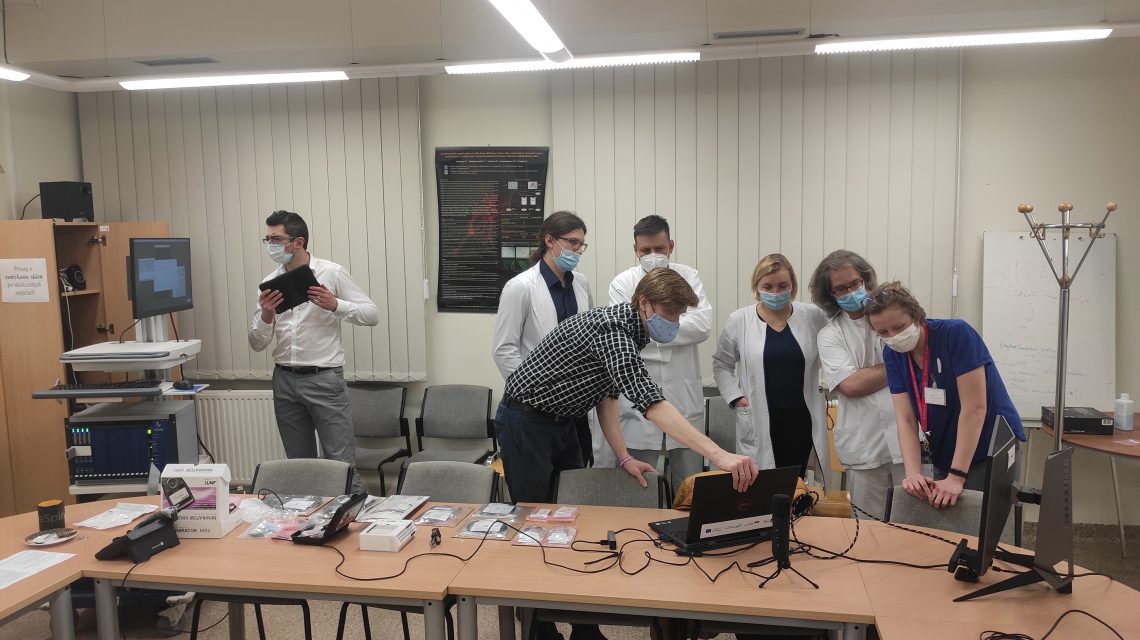The new year of breakthroughs and harvest for the neuroscience in Poland 3 lutego 2021 – Posted in: News – Tags: 2021, BME Lab, Brain Stimulation, Gdansk, kucewicz, Mayo Clinic, Michal Kucewicz, michal lech, Neuroscience, Poland, Science, Wroclaw Medical University
 The beginning of 2021 was marked by a rapid acceleration of our endeavours to pioneer intracranial brain recordings and stimulation in Poland. Together with our project partners at the Wroclaw Medical University we implemented recently purchased, state-of-the-art system called ‚Atlas’ (by Neuralynx Inc.) for clinical and research electrophysiological studies in the human brain. Two entire days in Wroclaw were dedicated to assemble and present the system to a team of experts at the university hospital. The team comprised of the lead neurosurgeon, Prof. Paweł Tabakow, the lead neurophysiologist, Dr. Wojciech Fortuna, the lead neurologist, Prof. Monika Służewska, and other key members of their departments. Dr Kucewicz and Dr Lech presented the Atlas system and how it will work with the memory tasks performed by patients implanted with electrodes during the surgery and throughout their hospital stay (see photo).
The beginning of 2021 was marked by a rapid acceleration of our endeavours to pioneer intracranial brain recordings and stimulation in Poland. Together with our project partners at the Wroclaw Medical University we implemented recently purchased, state-of-the-art system called ‚Atlas’ (by Neuralynx Inc.) for clinical and research electrophysiological studies in the human brain. Two entire days in Wroclaw were dedicated to assemble and present the system to a team of experts at the university hospital. The team comprised of the lead neurosurgeon, Prof. Paweł Tabakow, the lead neurophysiologist, Dr. Wojciech Fortuna, the lead neurologist, Prof. Monika Służewska, and other key members of their departments. Dr Kucewicz and Dr Lech presented the Atlas system and how it will work with the memory tasks performed by patients implanted with electrodes during the surgery and throughout their hospital stay (see photo).The main role of this system is to record electrical activities from the brain that are coming from special electrodes inserted on the surface of the cortex or inside the cortex. These electrodes are inserted into specific parts of the brain by the neurosurgeon after previous planning with the neurologists. In our project, they will go either into the deep structures inside the brain called the basal ganglia during the, so-called, Deep-Brain Stimulation (DBS) surgery or less deep in various parts of the brain’s cortex important in treating epilepsy. In these brain regions, the electrodes will detect activities of individual brain cells (neurons) and of the aggregate activities generated by thousands of cells. These are monitored during the insertion process by neurophysiologists, and then analyzed by the neuroscientists at our BME lab once recorded during memory tasks.
In the end, our delegation to Wroclaw was very successful. We completed surgical planning for inserting electrodes in the first patient, identified the last remaining components that are needed for the study, and tested the Atlas system and its connection with our memory tasks. We also met with Dr Jan Kaminski – a neuroscientist starting his laboratory at the Nencki Institute – who will be joining our efforts to pioneer the patient studies in Poland. The next delegation will focus on performing the study with a historically first patient in Poland implanted with special electrodes to study memory functions during surgical treatment of movement disorder. We are also preparing to use the same procedure with the first case of adult treatment of epilepsy with a surgical technique called stereo EEG monitoring. Thus, 2021 is a breakthrough year for neuroscience studies in Poland and a year of harvest for our project in the First Team grant from the Foundation for Polish Science. Can’t wait to share more news with you soon!

